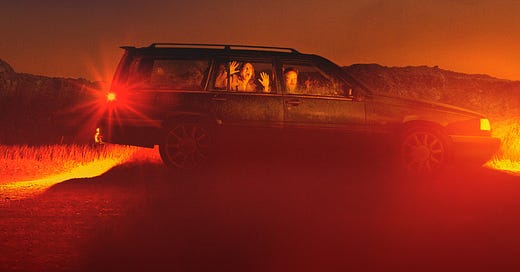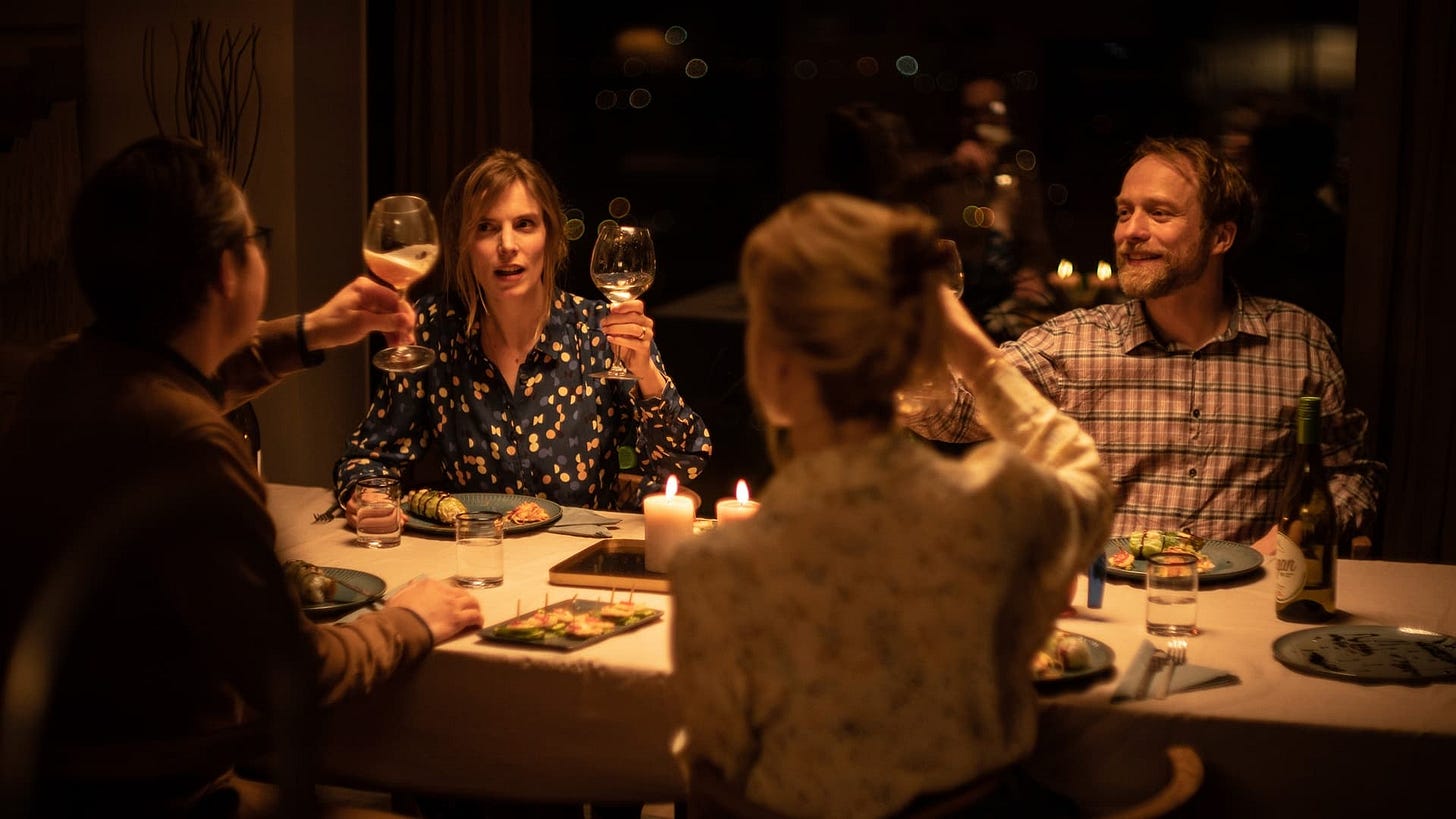SPEAK NO EVIL (2022) will leave you shaken, speechless, and stunned
The original Danish psychological thriller brilliantly, brutally pushes the bounds of social etiquette and anxiety to their darkest extremes.
- "Why are you doing this?"
- "Because you let me."
Never say you'll "be right back".
Never say "everything will be alright".
And never, ever, under any circumstances say "what's the worst that can happen?"
You may not think you're in a horror movie, but nowadays, the feeling of the way of the world sure does lend itself to the argument that all of life is a horror movie, and we're all living and dying in it every single day.
To say that Christian Tafdrup's Speak No Evil is a nerve-frazzlingly incendiary assault on the fears and nervous systems of those such as myself, whom come built with the combustible combination of social anxiety and overactive imaginations, would be the understatement of the century.
Perhaps the most haunting of psychological horror tales are the ones acutely attuned to sadistically exploiting the turbulent emotions and roiling anxieties we feel when our lizard-brain guttural instincts internally scream to us that we are deeply unsafe, while directly clashing with our supposedly rational dominant sides essentially gaslighting ourselves into choosing to believe we don't truly have anything to fear.1 An insidious defence mechanism developed in the face of an ostensibly civilised society most of us are taught to not disrupt the decorum of, lest we offend others who might or might not be threats, and alienate ourselves into self-made pariahs that others look upon as the real causes of concern. Our self-image as stable, calm, collected individuals is entwined within the need to uphold a facade of respectability that makes us look good, so we feel like we belong, even if there are those whom your gut tells you are wolves in sheep's clothing, for reasons that your mind, your upbringing, and maybe even your culture only equip you to think of as benign misunderstandings that are all in your head; you must be the problem, not them. A knotty problem of the modern human condition, because on the one hand, it should be a positive means for general empathy and nuanced understanding of both yourself and others, where you brace yourself from rushing to judgement, just in case you're mistaken; but on the other hand, the unwritten etiquette of how we civilly interact with other people can also be exploited by those who know the rules of the game of social contracts, and expertly ingratiate themselves into the lives of others for their own unknowable, unnervingly ambiguous, likely malignant ends. These sorts of slithery menaces - the covert narcissists, the amoral sociopaths, and the unclassifiably malevolent - push a million little buttons of tiny incremental manipulations to make sure the normal, the good, and the trusting of the world, do not firmly grasp and believe that they're being lead astray, until it's far too late.
That's what Speak No Evil captures with cruelly cunning skill. For most of its runtime, it strings you along just like its Danish family of polite-to-a-fault protagonists, Bjørn and Louise, are pitted against the contrasting bigger personalities of the Dutch family, Patrick and Karin, who've invited them to a long weekend stay at the latter's home. You know that something bad is going to happen, simply by virtue of the genre of film you're watching, and the oppressive tone of doom foretold by the dissonant blasts of discordant orchestral noise on Sune Kølster's score. Because of this constant portentous invocation of a looming threat we have yet to see, you know that the film knows something you don't, and only upon a second viewing (if you're ever brave enough to put yourself through such an ordeal again) will it come to make sense what you should have been afraid of, if only you - or the poor Danish family - knew what awaited them.
Yet the film stays remarkably restrained in the type, the frequency, and the escalation of subtle intrusions it depicts as the story progresses, walking that razor-thin line between things one would dismiss as examples of mere miscommunication or human forgetfulness, and things that you can't help but suspect are born of quiet malice. It holds up a mirror to every experience almost every person will have had when being guests in other people's lives, when you observed myriad big and small differences in the behind-closed-doors domestic behaviour between yourself and your host(s), and you face the dreaded question of whether it's them, or whether it's you, who's really the strange one here.
Do you feel disquieted because they're doing something that's definitely not okay, or because you're afraid of the potential shame and stigma that would come from unnecessarily causing a scene or creating an upset out of something that maybe you blew out of proportion?
Like a predator playing with its food before it sinks its teeth into its prey, Speak No Evil foments its pungent atmosphere of exponentially sickening dread by lingering in this all-too-relatable discomfort of what one risks by getting to know other people, and trying to make friends out of strangers. It builds its tragedy on the back of a simple yet effective character study of Bjørn's middle-aged male ennui fuelling his desire to break what he feels is the stagnancy of his everyday life of domestic mundanity. It's plain to see he seeks friendship and flattery from the effusive Patrick, whom Bjørn initially sees as a version of himself he wishes he could be - boisterous, amiable, free-spirited, unstifled by self-doubt, passionate for his wife, and passionate for the pleasures of life itself. A later scene in the movie practically turns into that bromantic bonding scene from I Love You, Man, when Jason Segal gets Paul Rudd to unburden himself of his anxieties by screaming in a place where no one will notice or care. But of course, since this is Speak No Evil, the similar moment between Bjørn and Patrick is laced with potent unease for where the film is fated to go from there.
And when the film finally does show its hand, revealing just what all the foreboding music, and the multitude of mildly malign violations of interpersonal niceties were warning signs for... well, that's when Speak No Evil metastasises into an unspeakably bleak nightmare of near-operatic tragedy, and profoundly upsetting horror that has the capacity to shake you to your core. When you hear the overall allusions to this film garnering a notoriety for just how deep into darkness it delves, this ending is where it gains its reputation, after it spent most of its runtime meticulously laying the gut-wrenching groundwork for the final knockout blow. As a prime example of Feel-Bad Cinema™ operating on the higher echelons of hopelessness, Speak No Evil feels like it earns its despair. Especially when the heights of its horrors reach past the purely literal, transcending into twisted symbolism and brutally timely allegory for our inescapable nightmare reality, where you need only look at what's happening in the world every day, until you're compelled to ask:
"How much evil will we allow to continue unchecked, before something is done to stop it? How much evil is deemed acceptable to ignore to maintain a status quo? How much violence does the silence equal by enabling it? How much longer do we allow evil to be done to us?"
Rating: ★★★★½
(i.e. The likes of Rosemary's Baby (1968); Invasion of the Body Snatchers (1978); Society (1989); Arlington Road (1999); The Invitation (2015); Get Out (2017); Midsommar (2019); plus a hundred other examples you can think of that easily fit the paranoid bill.)







